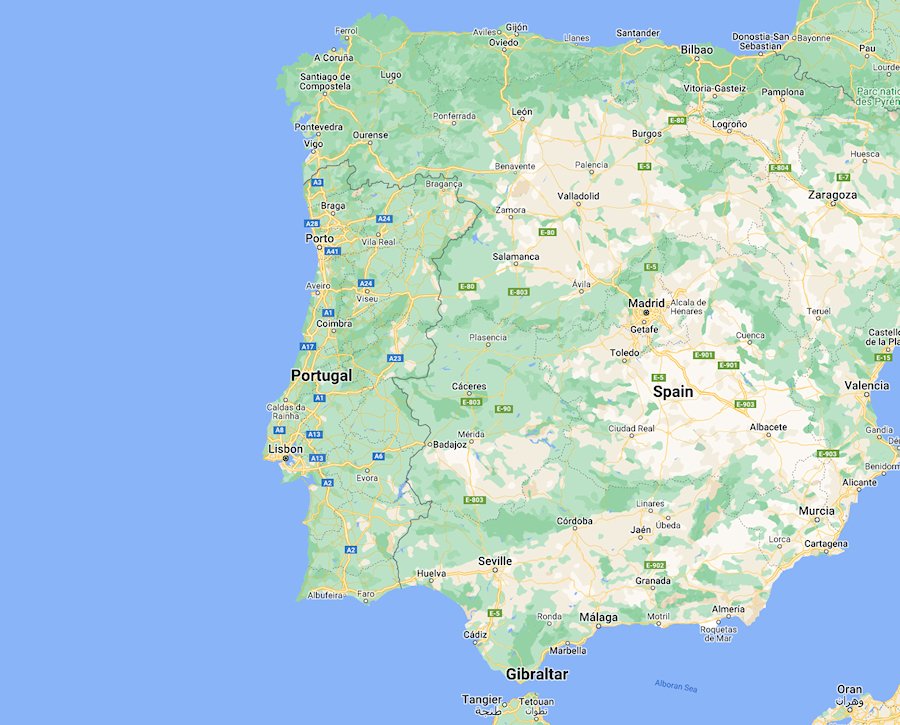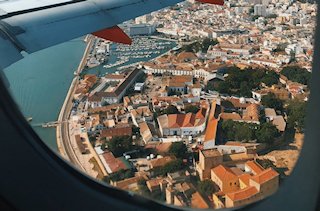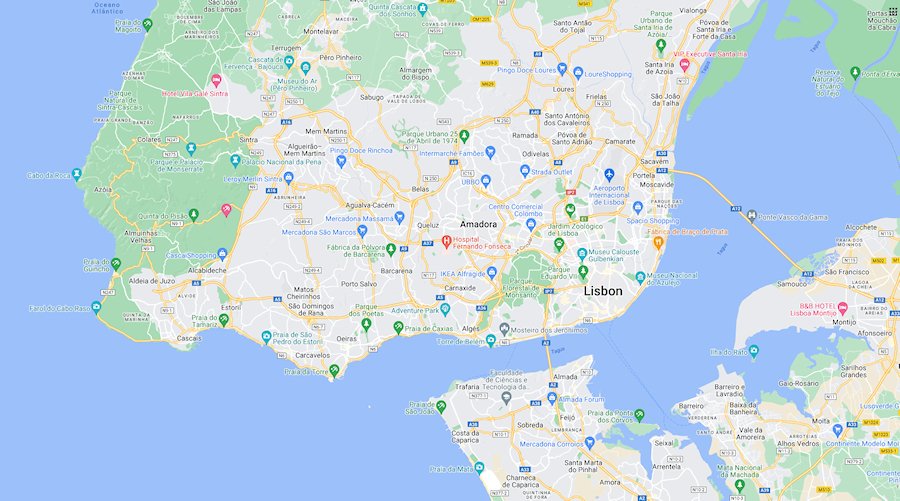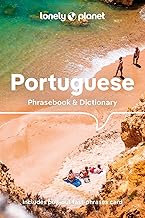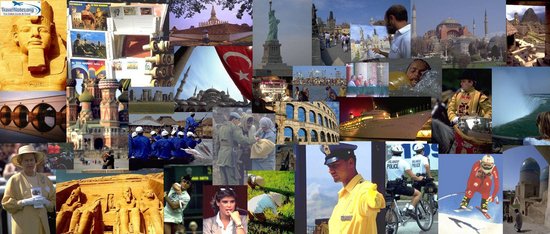Travel Notes: Europe - Portugal Travel Notes - Portugal Tours & Trips.
Short URL: https://tnot.es/PT
Portugal Travel and Tourism on Travel Notes
Discover Enchanting Destinations - Explore Charming Portugal
Immerse yourself in Portugal's rich history, stunning landscapes, and vibrant culture. Discover must-visit destinations and plan your dream getaway today. Share on Facebook
About Portugal
With its rich history, stunning natural beauty, and vibrant culture, Portugal is a treasure trove of experiences waiting to be discovered.
The Romans occupied the Iberian Peninsula from the 2nd century BC to the 5th century AD, and they left behind many important monuments to their presence.
Driving Distances in Europe
Driving From Faro - Driving From Lisbon - Driving From Porto.
 Add a Business -
Add a Location -
Add a Lodging - Add Travel Content
- Add URL
- Travel Services.
Add a Business -
Add a Location -
Add a Lodging - Add Travel Content
- Add URL
- Travel Services.
Mapping Portugal
Map of Portugal
Portugal is a country with a rich history, a welcoming culture, and a mix of modern and traditional influences.
Plan your escape to this captivating destination and prepare to be captivated by the undeniable charm of Portugal.
Whether you're interested in exploring historic sites, enjoying beautiful beaches, or savouring delicious cuisine, Portugal has much to offer to visitors.
Portugal Overview
Portugal, officially known as the Portuguese Republic, is a country located on the Iberian Peninsula in southwestern Europe.
Portugal offers a diverse range of experiences, from historic cities and cultural landmarks to beautiful beaches and natural landscapes.
Whether you're interested in history, cuisine, or simply enjoying the scenic beauty, Portugal has something for everyone.
Capital and Major Cities
The capital city of Portugal is Lisbon. Other major cities include Porto, Braga, Coimbra, and Faro.
Carnation Revolution
In 1974, Portugal underwent the 'Carnation Revolution'; a peaceful military coup that led to the end of the authoritarian Estado Novo regime and the establishment of a democratic government.
Cuisine
Portuguese cuisine is diverse and includes dishes like bacalhau (salted codfish), pastéis de nata (custard tarts), and various seafood specialties.
Port wine, produced in the Douro Valley, is famous worldwide.
Culture
Portugal has a rich cultural heritage, evident in its music, dance, literature, and traditional festivals.
Fado, a traditional genre of Portuguese music, is known for its melancholic and soulful expressions.
Economy
Portugal has a mixed economy with sectors like tourism, agriculture, and services playing significant roles.
Tourism is a major industry, attracting visitors to its historic cities, beautiful landscapes, and coastal areas.
European Union
Portugal joined the European Union in 1986, contributing to its economic and political integration with other European nations.
Exploration and Colonisation
During the 15th and 16th centuries, Portuguese explorers played a crucial role in discovering sea routes to India, Africa, and Brazil.
Geography
Portugal shares the Iberian Peninsula with Spain and is bordered by the Atlantic Ocean to the west and south.
The country has diverse landscapes, including mountains, plains, and a long coastline.
History
Portugal has a rich maritime history, with notable explorers like Vasco da Gama and Ferdinand Magellan contributing to the Age of Discovery.
It was a significant colonial power, establishing a global empire that included territories in Africa, Asia, and South America.
Language
The official language is Portuguese.
Natural Beauty
Portugal offers diverse natural landscapes, from the rugged cliffs of the Algarve to the vineyard-covered hills of the Douro Valley.
Tourist Attractions
Lisbon and Porto are popular tourist destinations, known for their historic architecture, vibrant neighbourhoods, and cultural attractions.
The historic town of Sintra, a UNESCO World Heritage Site, is known for its palaces and castles.
The Algarve region is famous for its stunning beaches and resorts.
Visiting Portugal
Whether you're a history buff, a beach lover, a foodie, or an adventurer, Portugal offers an unforgettable journey that will leave you longing for more.
Portugal Highlights
Algarve
Explore the stunning beaches and coastal landscapes of the Algarve region.
Popular destinations include Lagos, Albufeira, and Faro.
Faro Travel Guide - Sharing Algarve's Best-Kept Secret With You:
Serious budget airline travellers have long known a secret that Faro is
more than cheap flight tickets to the popular Algarve beach resorts of
southern Portugal.
Relax on the beautiful beaches, try water sports, and explore the impressive sea caves along the coastline.
Aveiro
Discover the charming town of Aveiro, often referred to as the 'Venice of Portugal' due to its canals and colourful Moliceiros boats.
Try the local specialty, ovos moles; a sweet made with egg yolks and sugar.
Coimbra
Visit the historic city of Coimbra, known for its university; one of the oldest in Europe.
Explore the Joanina Library and the Royal Palace of Alcáçova and enjoy the vibrant atmosphere in the city's medieval streets.
Cultural Events
Check the local events and festivals happening during your visit to Portugal, such as the Fado music performances in Lisbon, traditional festivals, and local celebrations around the country.
Douro Valley
Experience the scenic beauty of the Douro Valley, known for its terraced vineyards.
Take a river cruise or a scenic train ride.
Visit a wine estate to taste the famous Port wine and enjoy the picturesque landscapes.
Évora
Explore the well-preserved medieval city of Évora, a UNESCO World Heritage Site.
Visit the Roman Temple of Évora, the Cathedral, and the Chapel of Bones.
Wander through the narrow streets and enjoy the local cuisine.
Lisbon
Begin your journey in the capital city, Lisbon.
Explore the historic neighbourhoods of Alfama, Bairro Alto, and Baixa.
Visit iconic landmarks such as the Belém Tower, Jerónimos Monastery, and São Jorge Castle.
Take a tram ride through the narrow streets of Alfama and enjoy panoramic views from the Miradouro da Senhora do Monte.
Porto
Head to Porto, a city known for its charming riverside district, the Ribeira.
Explore the historic city centre, a UNESCO World Heritage Site.
Visit the Livraria Lello, one of the most beautiful bookstores in the world, and the Clerigos Tower.
Take a boat cruise on the Douro River and visit a port wine cellar for a tasting experience.
Sintra
Discover the enchanting town of Sintra, known for its fairytale-like palaces and gardens.
Visit the Pena Palace, the Moorish Castle, and the Quinta da Regaleira.
Stroll through the narrow streets of the historic centre and enjoy the scenic beauty of the Sintra-Cascais Natural Park.
Portugal Background Info
Portugal gets its name from the Comitatus Portaculenis fiefdom which extended around the old Roman seaport of Portus Cale; now Oporto.
The Visigoths came along in the 5th century and were followed by the Moors in the 8th century. Both of their styles can still be seen in Portugal's older buildings and churches.
Bermudo II, king of Leon, retook the northern territory, between the Douro and Minho rivers, from the Moors in 997 and by 1064 Ferdinand I, king of Castile and Leon had completed the reconquest as far south as present-day Coimbra.
Alfonso Henriques, later Alfonso I, king of Portugal, rebelled against his mother and Spanish fiefdom in 1128, and in 1179 the pope recognised the independence of Portugal.
King Alfonso III completed the expulsion of the Moors from the Algarve and relocated the capital of Portugal, from Coimbra to Lisbon, during his reign (1248 to 1279).
In the 15th century Henry the Navigator, prince of Portugal, encouraged exploration of the African coast for an eastward route to the Indies to bypass Arab taxation and hostilities the traders might face in the Middle East.
The eventual route to India was not discovered until after Henry's death though: Vasco da Gama, in his voyage of 1497-1499, followed Bartolomeu Dias's 1487-1488 rounding of Africa and started the lucrative sea trading between Europe and Asia.
Lisbon
Map of Lisbon
Lisbon is the capital of Portugal.
If you're not on a charter flight to the beaches of the Algarve then you will probably arrive here by train from Spain, or fly in directly.
Walk through the old city of Lisbon and you might be tempted to think about the seamen and merchants who strolled the narrow, winding streets during the city's illustrious history.
The Monastery of Jeronimos was built in 1498 to remind us of these 15th-century seafarers who opened the ocean trade route to India.
Lisbon Travel Guide - Visiting Portugal's Captivating Capital:
Discover why Lisbon has become the most talked-about city break
destination in Europe, with world-class food and cobblestone streets
telling romantic stories.
US Embassy in Lisbon
The US Embassy in Lisbon is located on Av. das Forcas Armadas.
Portugal Tourism
On a visit to Portugal, be sure to get into the countryside. Rural life is still the backbone of this Iberian country.
Even if your visit to Portugal is primarily to get a tan, you would miss the essence of the country if you didn't hire a car and visit some of the villages.
Many of Portugal's finest churches were created during the Renaissance and Baroque periods of the country's golden age.
Visit Portugal
Enjoy the sunny climate and diverse geographic features of Portugal by discovering what is unique about each region.
Alentejo
The plains that extend as far as the eye can see start close to the Tagus.
While to the north, the pace is set by the green of the flatlands, further south the landscape combines with the sun, the heat and a slower pace of life.
This is the Alentejo.
Algarve
With over 3,000 hours of sunshine per year and a low annual average rainfall, the Algarve enjoys mild weather throughout the year, which is certainly a big attraction for visitors.
Azores
Mother Nature has created a land full of natural beauty, ready to be explored, in the blue immensity of the Atlantic Ocean; the Azores.
Central Portugal
In Central Portugal, the interior of the country, there are mountains and villages of granite and schist.
By the sea, fishing villages and cosmopolitan beaches with water sports set the pace of the day.
And everywhere centuries old heritage is proudly displayed in the historical villages of the region.
Madeira
Right in the middle of the Atlantic, the islands of Madeira and Porto Santo are a haven of natural beauty.
The exotic colours of the flowers stand out from among the blue sea and the emerald green vegetation.
Porto and the North
It was in Porto and the North that Portugal was founded in the 12th century and the Portuguese became a people and a nation.
Northern Portugal Travel Guide - Far Away From The Algarve:
Far from crowded beaches and tourist traps Northern Portugal offers
ancient cities, world-class wine, and authentic Portuguese culture
without Algarve prices.
Porto Travel Guide - Northern Must-See Sights and Local Secrets:
With centuries of history and a buzzing contemporary culture, Porto will
have you planning your return before you even check out of your hotel.
Portugal Tours
BikeIberia
Based in Lisbon, BikeIberia provides top biking services in Portugal and Spain to an international clientele.
Sintra
Only 30km from Lisbon, you would be missing out if you didn't leave the capital for a visit to Sintra - a UNESCO World Heritage Site and once referred to by Lord Byron as 'this glorious Eden'.
Abounding in history the town of Sintra is dominated by the two conical chimneys of the Palacio Nacional da Vila - the summer home of the Portuguese royal family since the 15th Century.
Hotel Nova Sintra:
Ideally located in the old part of the village of
Sintra with beautiful views over the unique hillside of this immortal landscape.
Quinta Verde Sintra:
If you're looking for a little turismo rural, a stay at this restored country house, with
swimming pool, might be ideal for you.
Portuguese Language
A commonwealth of Portuguese-speaking countries was formed on July 17th, 1996, to preserve the Portuguese language, co-ordinate diplomatic efforts, and improve co-operation among its members: Angola, Brazil, Cape Verde, Guinea-Bissau, Mozambique, Portugal, and Sao Tome e Principe.
Portuguese for Travellers:
Teach yourself basic Portuguese before you travel to Cape Verde.
Portugal Travel Guides
Portugal Travel Guides - Portugal Maps.
Weather in Europe:
Local weather forecasts for destinations around Europe.
|
|
More From Travel Notes
Travel Notes Online Guide to Travel
Africa - Asia - Caribbean - Europe - Middle East - North America - Oceania - South America.
The Travel Notes Online Guide to Travel helps visitors plan their trip with country and city travel guides, local tourist information, reviewed web sites, and inspiring travel content.
Travel and Tourism Guides on Travel Notes
Travel Professionals Based in Portugal.
Add Your Portugal Travel Listing.
 If you find Travel Notes useful, please take a moment to
like us on Facebook and share with your friends on social media.
If you find Travel Notes useful, please take a moment to
like us on Facebook and share with your friends on social media.
Share on Facebook
Travel Resources
.
Travel & Tourism With Industry Professionals.





